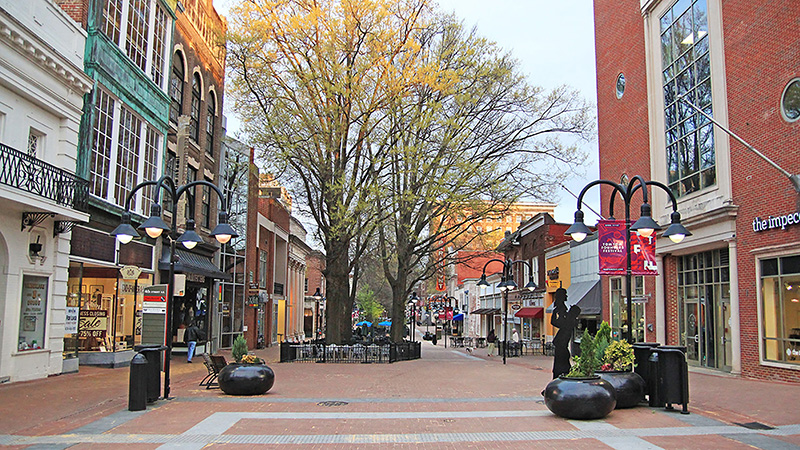
Image of a portal connecting Vilnius, Lithuania to Lublin, Poland.
A portal is a large public communications tool that provides a live video and audio connection between distant parts of the world. It works best in a town or city with a public pedestrian central space. A portal can connect one city with one or more other cities.
Benediktas Gylys, initiator of Lithuania’s portal project explained: “Humanity is facing many potentially deadly challenges; be it social polarization, climate change or economic issues. However, if we look closely, it’s not a lack of brilliant scientists, activists, leaders, knowledge or technology causing these challenges. It’s tribalism, a lack of empathy and a narrow perception of the world, which is often limited to our national borders…..[The portal] is a bridge that unifies and an invitation to rise above prejudices and disagreements that belong to the past.”
Inspired by the success of similar projects, we intend to create our own, starting in Charlottesville, Virginia, in the United States and its Sister Cities of Winneba, Ghana; Huehuetenango, Guatemala; Poggio a Caiano, Italy; and Besançon, France. Our goal is to raise the funding for two or, ideally, all five portals and offer it to the City of Charlottesville, or to some other entity should the city decline.
Should the project not be realized in the above locations, or should we raise more funding than is required for those locations, we will offer the funds to other towns and cities that agree to create portals. Interested parties can contact us. Should no locations be found, the funds will simply go to World BEYOND War’s other work for peace.
We have discussed possible plans for the construction of portals with a number of people and tentatively developed a plan for a 6-foot-diameter circle made of stainless steel and plexiglass, mounted on a rectangular base and containing a round screen. The top of the circle would hold solar panels. The portal would include a motion detector, allowing it to turn off unless there is motion present, a button for volume, and a button to cycle through connections with other cities. The base or frame might include a map showing the locations of the other cities, and words thanking those who’ve made it possible. We have roughly estimated the construction cost of a portal at $20,000 plus $10,000 for technical set-up, $1,000 for video screen, $1,000 for cables, router, electrical equipment, video camera, speakers, and motion detector, $1,000 for solar panels, for a total of $33,000 per portal or $165,000 for five portals — costs that may be reduced by working with volunteers, students, interns, and in-kind donations. We estimate the ongoing expenses to the owner of a portal at $20/month for internet, $5/month for cloud hosting, plus any expenses for insurance and maintenance. An additional cost will be for shipping if multiple portals are constructed in one location.
Yes! If mailing a U.S. check or international money order, make it out to World BEYOND War and mail it to 513 E Main St #1484, Charlottesville VA 22902, USA. Clearly label it for Portals. Thank you!
If you can’t donate on this page with your credit card, another option is to donate through Paypal here.
World BEYOND War is a 501c3. U.S. donations are tax deductible to the fullest extent of the law. Please consult your tax advisor for details. World BEYOND War’s U.S. tax ID is 23-7217029.

A possible location for a portal is the pedestrian Downtown Mall in Charlottesville, Va., U.S. (Photo by David Lepage.)




